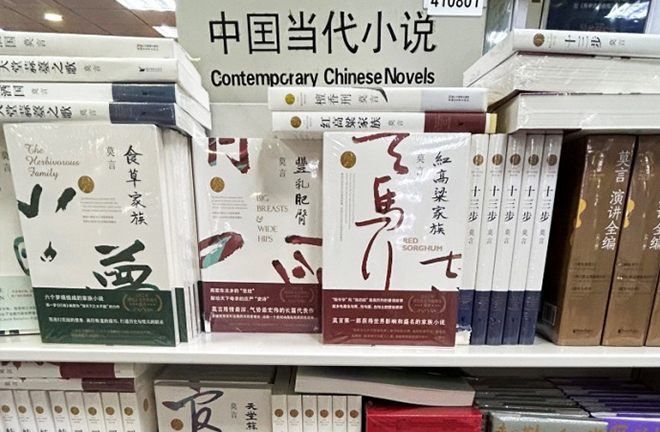Cities and villages in eyes of writers

A display of contemporary Chinese novels at Wangfujing Bookstore in Beijing Photo: Yang Lanlan/CSST
As the core concern of Chinese modernity, the relationship between cities and the countryside, with their conflicts and interaction, constitutes the driving force behind the development and internal tensions of Chinese new literature. On August 17–18, an academic symposium titled “The City and Countryside in Chinese New Literature” was held in Harbin, Heilongjiang Province. Scholars in attendance conducted an in-depth analysis of how cities and rural areas have been depicted in modern Chinese literature, aiming to offer valuable insights for contemporary efforts at urban-rural integration and literary creation in China.
Representations of social changes
The phenomenon of “rural people entering cities” and the resulting social tensions have become important topics both in urban and rural literature. Zhao Xueyong, a professor from the School of Chinese Language and Literature at Shaanxi Normal University, believes that this narrative has become an important motif in modern and contemporary Chinese literature, even serving as a recurring theme throughout. The tradition of “rural people entering cities” is intertwined with the century-long process of rural China’s modernization, forming a complex, mutually reflective relationship rich with modern significance. The narrative tradition offers a unique way to examine the evolving dynamics between urban and rural areas in China, offering insights into Chinese modernization and reflecting the historical and cultural transformations of the past hundred years.
According to Shao Ningning, a professor of the humanities at Hangzhou Normal University, Sun Li was one of the earliest writers to focus on the “moving to the city” issue. His portrayal of the rural world differed from traditional, polarized narratives, depicting it instead as a self-sustaining agrarian society imbued with primitive Confucian warmth. The “sentimentality” evident in the work of Sun’s later years not only reflects his experience of the changes in human nature brought about by shifting environments but also mirrors deeper feelings and melancholy amid the transformation of Chinese society from tradition to modernity.
As one of the most urbanized cities in China’s modernization process, Shanghai’s urban literature offers significant insights for studying modern Chinese literature from the perspective of urban-rural relations. Luo Gang, a professor from the Department of Chinese Language and Literature at East China Normal University, focused his analysis on the concept of “modernity.” Through reflecting on studies of Shanghai literature and culture in recent years and advocating for an approach that examines the “whole” through its “parts,” Luo came to posit that the development and changes in modern Shanghai are integral to the emergence, evolution, setbacks, and rebirth of “Chinese modernity.”
New development pathways
Against the backdrop of advancing urban-rural integration, exploring the social relations between cities and the countryside holds significant theoretical value for expanding the development pathways of new literature. Wang Xiaoming, director of the Center for Contemporary Cultural Studies at Shanghai University, emphasized the need to discuss urban and rural literature after clarifying the relationship between cities and the countryside. In China’s development history, the economic focus shifted from “villages” to “cities,” triggering changes in the urban-rural circulation system, and the rise of modern literature began to replace traditional forms. Modern literature has profoundly shaped the understanding of urban and rural dynamics, both emotionally and intellectually. This narrative and understanding, once established and disseminated, have contributed to the enduring stability of urban-rural structures and relations that continues to this day.
As rural revitalization efforts continue to progress, the themes of rural literature are also evolving. Ma Bing, a professor from the School of Literature at Shandong University, noted that current literary reflections on rural changes remain insufficient. It is necessary to further excavate the underlying cultural structures of the countryside during this period of social transformation, as well as the related shifts in rural ethics, emotional frameworks, and lived experiences. This requires researchers to carefully “listen” and “ask” to understand whether, after the rapid development and ecological initiatives driving rural revitalization, the dilemmas facing rural communities have been genuinely alleviated or if new challenges have emerged. Researchers need to adopt a more comprehensive “viewfinder,” approaching rural development with a broader and more profound perspective to capture the complexity of China’s rural development.
The rapid development of cities has had a significant impact on modern urban-rural relations. Guo Bingru, a professor from the Department of Chinese Language and Literature at Sun Yat-sen University, explained that the phenomena of “a thousand cities with one face” or “a thousand faces in a city” seen in modern cities offer multiple possibilities for urban writing in literature. In Jia Pingwa’s Xi’an, Wang Anyi’s Shanghai, and the “New Southern Writing” featuring Guangzhou (Pearl River Delta), the juxtaposition of urban and rural elements reveals a dynamic process of modernization as geographical spaces and cultural boundaries of urban literature are redefined. In this context, today’s city is no longer a closed, singular space, but a rather chaotic and open environment where various strata and cultural communities compete and collaborate for survival and development. As the textures of the city increasingly reflect the complex realities of Chinese society, literary scholars should consciously engage with these realities, positioning urban writing as an important component of the literary landscape.
The conference was hosted by the School of Chinese Language and Literature at Harbin Normal University and other institutions.
Edited by YANG LANLAN

 PRINT
PRINT CLOSE
CLOSE